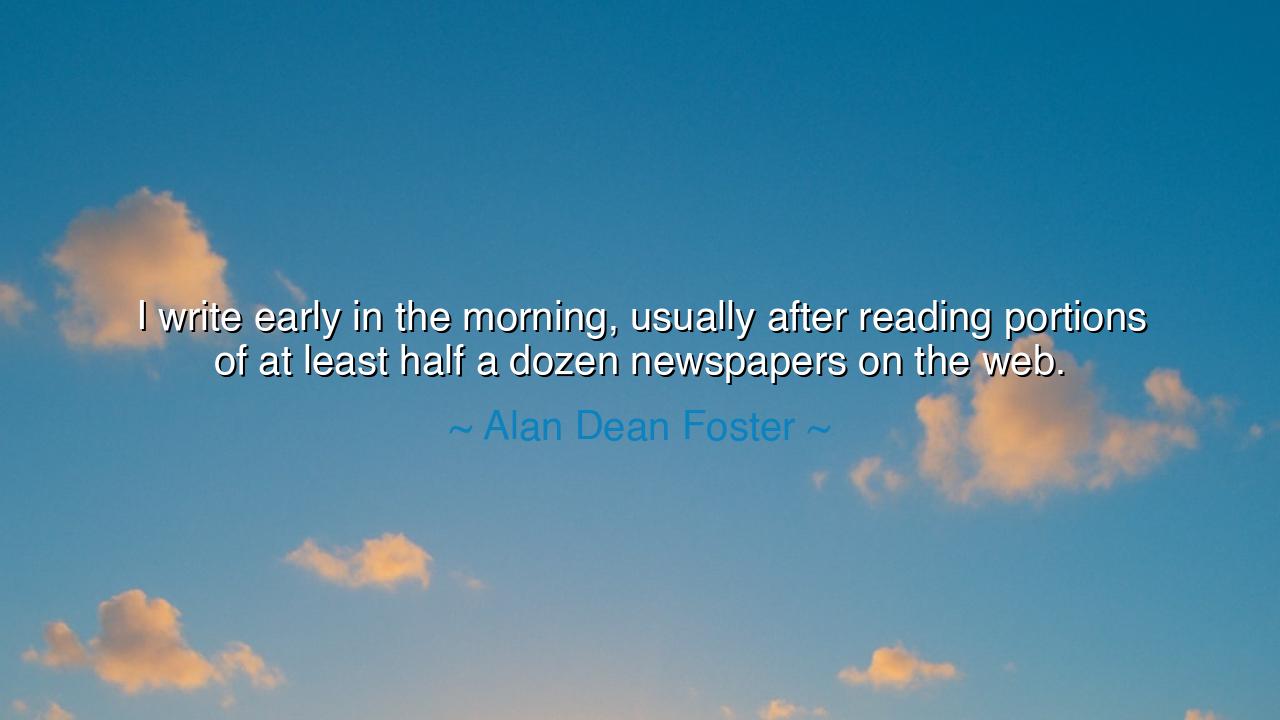
I write early in the morning, usually after reading portions of
I write early in the morning, usually after reading portions of at least half a dozen newspapers on the web.






"I write early in the morning, usually after reading portions of at least half a dozen newspapers on the web." — Alan Dean Foster. In these words, Alan Dean Foster reveals a truth about the nature of writing and the creative process. The writer does not simply dive into their craft without preparation; rather, they immerse themselves in the world first, drawing from the vast and diverse pool of information and perspectives that surround them. Foster understands that to write with depth and understanding, one must first take in the pulse of the world, to see beyond their own thoughts and experiences. This early morning ritual, reading the news from various sources, is not just a habit, but a means of sharpening the mind, of gathering the fragments of reality to weave into the fabric of fiction.
In the age of the ancients, the philosophers too recognized the importance of gathering knowledge before embarking on their own pursuits. Socrates, whose wisdom was built upon asking questions and seeking truth, did not approach life with a closed mind. He listened to the world around him, engaging with people from all walks of life to understand different perspectives. Foster's ritual of reading many newspapers echoes this ancient wisdom: to be a writer, or a philosopher, or a leader, one must first understand the world in all its complexity. The wisdom of the world is not confined to a single viewpoint but lies scattered across many voices, and it is only by taking in all these viewpoints that we can truly understand the shape of things.
Consider the life of Plato, who, in his Republic, speaks of the need for the philosopher to turn their gaze away from the shadows on the wall and look directly at the light of knowledge and truth. But how does one find this truth? By engaging with the world, by absorbing the wisdom of those who came before and those who live now. Plato did not simply sit in his study and meditate; he conversed with the wise of his time, engaged with the realities of his world, and sought to understand the many facets of human existence. In this sense, Foster’s method of reading widely is not just a modern habit—it is a timeless approach to the creative process, one that draws from the richness of the world and channels it into the realm of fiction.
In Foster’s words, we see a reflection of the ancient art of storytelling, where the storyteller was not isolated from the world but deeply connected to it. Think of the Bards of ancient Greece, whose tales of heroes and gods were informed by the world around them. They did not simply craft their stories from imagination alone; they weaved them with the threads of history, society, and the eternal truths of the human experience. Foster’s act of reading newspapers is his way of absorbing the pulse of the world, ensuring that his work is informed by the realities of human existence, even as he spins his imaginative tales.
This approach is also reflected in the life of the Roman poet Virgil, whose Aeneid sought to capture not only the mythology of Rome’s founding but also the real struggles of his people. His writing was deeply connected to the political and social currents of his time. Virgil’s creativity, like Foster’s, did not emerge from a vacuum; it was deeply rooted in the world he lived in, in the events and concerns that shaped his world. For Virgil, writing was an act of understanding the world, just as Foster’s writing begins with the world, informed by the stories, facts, and truths he encounters each morning.
Thus, the lesson here is clear: to be a true creator—whether in writing, philosophy, or any other art—we must engage with the world around us. Foster’s routine reminds us that the creative process is not one of isolation, but of deep engagement with the realities of life. Writing, like any form of creation, is not simply about inspiration that strikes from nowhere. It is about drawing from the well of knowledge, of engaging with the world’s voices, and reflecting upon them. Only by doing so can we truly create something that resonates with others, something that speaks not just to the imagination, but to the very truths of human experience.
So, let us take Foster’s example into our own lives. If we are to create—whether through writing, art, or any other form—we must first understand the world we live in. We must engage with the voices around us, draw wisdom from every corner, and approach our craft not as an escape from the world, but as a way to reflect it, to engage with it, and to transform it into something that speaks to the soul. Let us be as the ancients were, open to the world, ever hungry for knowledge, and through this knowledge, find the wellspring from which our creativity will flow.






AAdministratorAdministrator
Welcome, honored guests. Please leave a comment, we will respond soon